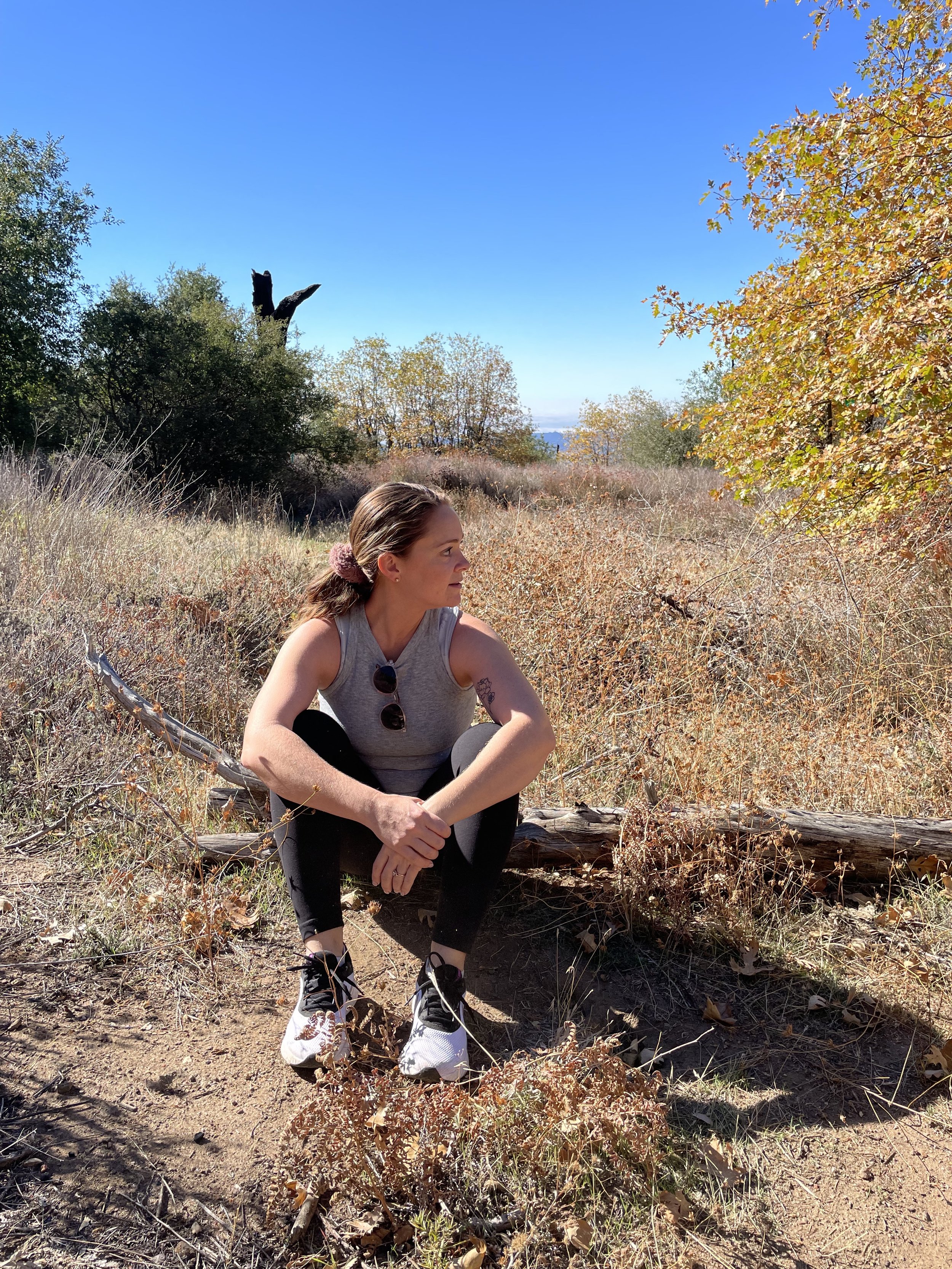Its time to grieve well
Redefine your grief.
Embrace your call to healing, fully equipped with the mindset, knowledge, emotional clarity, spiritual depth, and practical actions needed to truly step into radical healing.
Mind. Body. + Soul.
Good Grief
Good Grief
When I was a freshman in college, just four and a half years after my brother died in a car accident, we were taught in one of my core psychology course lectures that if a person was still experiencing sadness, depressive symptoms, and a longing for the deceased after six months of grieving, they could be diagnosed with “complicated grief,” a mental health disease which needed medical treatment. While medication has its place and is irrefutably necessary in some cases, this clinical, sterile, time-stamped, misunderstood view of grief pissed me off. I thought, “How could something so vulnerable and personal be reduced to such a calloused, impersonal label?”
I raised my hand in the lecture hall and boldly spoke up—for myself and for all of us who have been in some way shamed for our long-term grief.
“My brother passed away in a car accident less than five years ago and I still go through periods of sadness, depression, and longing for him. But, I’m not clinically depressed. There’s nothing wrong with me, I will just always grieve the loss of his life and time stolen from us.” The professor fumbled for words to rationalize the material without dismissing his student’s vulnerable statement.
What his response was, I don’t remember. But that moment of feeling so easily dismissed for my residual grief will never leave me.
Because even though we are adaptive beings, grief does take more than six small months to fully explore, experience, and heal.
As Dr. Gabor Matê puts it, “Grief is not hopeless sadness; grief is coming to terms with a loss.” And truly coming to terms with a loss can take many of us years. This is a truth I knew as a teen, forever changed by the death of my brother. But, what I would further discover years later, after the death of my mother, is that grief is misunderstood and mistreated in so many more ways than a time-stamped expectation of healing and returning to “normal”, and a grief that I thought had been in my past had very much been alive and active in the form of survival habits and stress-related diseases for the whole fifteen years since my brother’s passing.
Often viewed as solely an emotional experience, what’s overlooked in the grief process and not commonly talked about is the chronic stress response that we live in; whether aware of it or not. That stress response is called fight or flight. What’s not being largely addressed is the fact that emotional stress always causes physical symptoms; a process called somatization. Sleep disturbances, chest flutters or pain, shortness of breath, headaches, digestive upset, loss of appetite, high blood pressure, high blood lipids, interrupted/irregular menstrual cycles, skin conditions, and the list goes on. All resulting from repressed or unresolved emotional distress.

Our bodies do not distinguish between emotional and physical stress.
Grief’s emotions, intensity, and triggers are interpreted as a threat. So, our body engages the fight-flight-freeze response, instantaneously pumping adrenaline, blood-thickening platelets, cholesterol, and glucose throughout the body. If the threat lasts longer than minutes, as is typical in a state of grief, then cortisol is released, keeping the senses alert, over-aroused, and our blood oversaturated with imbalanced hormones, cholesterol, and glucose.
Constantly living in fight or flight, constantly exposed to an influx of cortisol and adrenaline can have catastrophic short- and long-term effects on the body, such as increased inflammation, rising blood pressure, and increased risk of blood clots and heart attack, weight gain, high blood sugar, and diabetes. Stress even impacts the immune system, ranging from something mild like decreased immunity to something more severe, like triggering genetic or autoimmune diseases.
Many of us “flee” or “fight” grief, even if unconsciously through distraction.
Our grief then can become a prolonged, sometimes even lifelong perpetuated, underlying yet major stressor.
its time to grieve well
Check out upcoming events or keep reading for more of my Good Grief journey and how you fit into this narrative…
So, how do we address such a traumatic, deeply personal, and sometimes isolating experience? As individuals? As a society?
As I journeyed deeper into my grief healing, I wasn’t seeing the resources that I was looking for. I didn’t see an all-inclusive conversation that grief is just as physical as it is mental, and just as spiritually-shaking as it is emotionally-charged.
I wanted something all-encompassing, candid, and physiologically informing yet radically empowering. I wanted the resource that said, “Hey, you’re not okay. I’m not going to label or judge you for that, or tell you that you’re doing it wrong. I’m going to show you what’s under the surface so you can deal with what’s coming to the surface. I’m going to offer you compassion, guidance, introspective knowledge, and a practical way through this.”
Much to my dismay, I just couldn’t find this type of resource…
So I created it.
As we see with fight-flight-freeze and somatization, grief quite effectively depletes us on a body, mind and soul level, with many of us also experiencing a spiritual crisis after a major loss. The answer to a depleted body, mind and soul cry for help, is a caring body, mind, and soul embrace.
The Grieve Well approach shines a ray of hope to those who have become disconnected from, or bury, and avoid grief. It marries my seventeen year-long intimate grief walk, with a backbone of my educational, actionable expertise of lifestyle medicine, whole-being health, and psychology to offer a self-guided and inclusive untangling of grief, providing new ways for you to move forward into a radical acceptance and self-love of a new, tended-to identity in life after loss.
In Grieve Well, we’ll answer this call to true healing by laying out a unique approach that transcends any quick-fix solutions, which often fall short of a full-scale healing experience, because as we’ve discovered…grief isn’t a quick-fix. It deserves more than a band-aid.

What is the Grieve Well approach?
-
· conscious deep breathing
· meditation
· heart-pumping and nervous system-balancing physical activities
· gut-healing, hormone-balancing, brain-supporting nutrition
· yogic wisdoms and exercises
· stress-reducing self-massage
· social support
· increases emotional awareness and emotional intelligence
Used regularly, these work on a physical level to calm inflammation and blood pressure, lower the risk for heart problems and long-term chronic disease, and ease depression and anxiety, all while physically releasing the person from the grip of grief into the peaceful space of compassionate healing.
On a mental, emotional, and spiritual level, these practices open up the individual to embracing more compassion, more safety, more vulnerability, and more bravery in feeling our way through healing.
During Grieve Well events…
-
Consider how loss or trauma affects them today
Consider how loss or trauma has altered one’s thoughts and/or behaviors for better or worse
Embrace or commit to working towards embracing a compassionate grief journey
View grief as a life’s rite of passage that all must journey through
View the grief journey with a perspective of control, choosing the experience that one wants, for better or worse, instead of feeling out of control and along for the rollercoaster ride
My Promise to You
Lasting, impactful change comes through learning better in order to live better. Science-backed research is woven throughout the events and support group to educate on aspects of health during periods of grief that are not commonly discussed but are crucial to well-being. Through implementing practices such as meditation and spiritual practices, calming diaphragmatic breathing, enjoyable movement, soul-nourishing food, and more, you are invited to journey through your deep grief equipped with the mindset, knowledge and practical actions needed to truly heal the whole mind, body, and soul. As you learn to tend to your whole being you gain bravery in the truth that you are capable of enduring hardship and accomplishing hard things. You will gain the confidence, courage, and self-assurance to walk through painful grief and live joyfully healed.
Meet Abby
My unique exposure to death and grief, combined with my extensive background in and knowledge of biological and emotional health, psychology, integrative nutrition, all around holistic living, and a deep empathy for everyone I encounter, unexpectedly brought me to this intersection of work in the grief space.
On an individual level, I aim to inspire the grieving to challenge their natural instinct to push away pain, and instead embrace and rise above their grief while employing radical self-care. Equally important, I hope to make ripples that turn into waves of positive cultural change surrounding the grief journey, which is deeply fraught with cultural norms of fear, repression, and isolation that fail so many.
I host the Grieve Well events and hub in hope that you are inspired to act on your innate desire to pursue pleasure over pain, or in this case, pleasure alongside pain; creating spaces where the body is able to down-regulate the unavoidable stress responses accompanying grief, and simultaneously give the mind, body, and soul a rest and reboot.
Now come along, let’s learn to focus on our own healing and live as we all truly deserve to live: joyfully free, abounding in love, and walking in our truth and God-given right to live healed.









